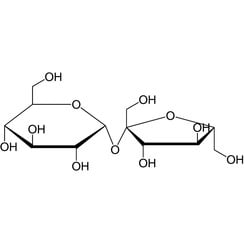You have no items in your shopping cart
Sucrose
Sucrose is common sugar. It is a disaccharide, a molecule composed of two monosaccharides: glucose and fructose. Sucrose is produced naturally in plants, from which table sugar is refined. It has the molecular formula C12H22O11.
For human consumption, sucrose is extracted and refined from either sugarcane or sugar beet. Sugar mills – typically located in tropical regions near where sugarcane is grown – crush the cane and produce raw sugar which is shipped to other factories for refining into pure sucrose. Sugar beet factories are located in temperate climates where the beet is grown, and process the beets directly into refined sugar. The sugar refining process involves washing the raw sugar crystals before dissolving them into a sugar syrup which is filtered and then passed over carbon to remove any residual colour. The sugar syrup is then concentrated by boiling under a vacuum and crystallized as the final purification process to produce crystals of pure sucrose that are clear, odorless, and sweet.
Sugar is often an added ingredient in food production and food recipes. About 185 million tonnes of sugar were produced worldwide in 2017.

